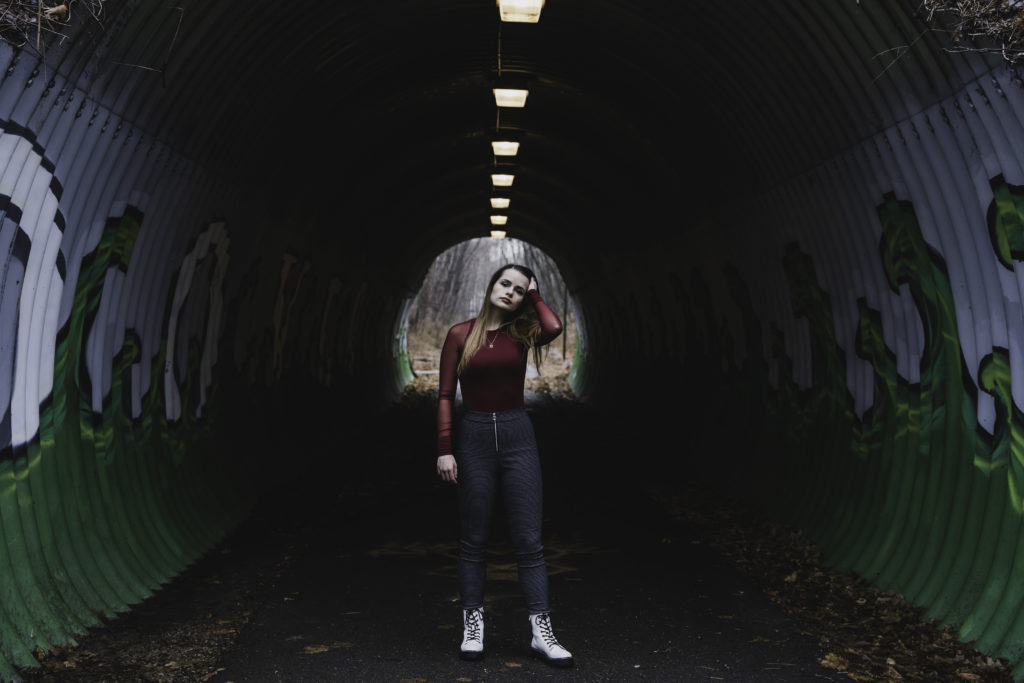In Conversation with Elunia (Video Podcast Exclusive)
New Hampshire-based singer-songwriter Elunia discusses her song “Pressure Points,” breaking the algorithm, connecting with fans, and provides Indie/Alt’s Bren Swogger with an astrology lesson in this EXCLUSIVE video podcast for Indie/Alt. Cover photo courtesy Elunia.
Bren: Welcome to another episode of the Indie/Alt Podcast. My name is Bren Swogger and today I’m joined by New Hampshire-based singer-songwriter, multi-instrumentalist, the multitalented Elunia. Thank you so much for taking time out of your day to chat with us.
Elunia: Thank you so much for having me.
Bren: To start, I’d love if you could just introduce yourself to people out there who might not know who you are yet. Where did you get your start in music and what has your journey been up to this point?
Elunia: I make ethereal alternative pop music that deals with a lot of themes of mental health and the dynamics of human interaction. I would say that’s where my journey started. I remember writing the first song that meant something to me as I was in one of those moments when you’re walking with people on a sidewalk and you’re the person that’s pushed behind them because you don’t fit. That was always me in life. And I remember writing lyrics for the first time that meant something on one of those occasions, and after that, I just sort of ran with it. I was always in my school practice rooms, writing like crazy. I started to experiment with production, which was something I had been messing around with since I was like 10, but then I got really into it, and I would spend all my time doing it. It felt like this cathartic way to take all of those emotions that I had about feeling isolated and feeling like no one understood what I was going through and putting them into something that felt significant to me. Then in 2018, I had a chance encounter with a producer online. I produced my music, but he helped me take it to the next level by doing mixing and doing some additional production. It helped me see, wow, like my music could be something real.
Bren: You’ve put out a few songs now. What’s that been like to kind of take it to that next level?
Elunia: It’s been amazing to hear how it’s resonated with people. I’m a person who likes to talk to people one-on-one. I have met so many amazing people and had those conversations and that’s been incredible, honestly.
Bren: I would love to talk about this new song that you just put out, “Pressure Points.” Where do songs start for you? I saw that you start a lot of songs on the piano. Was that the case with this one?
Elunia: Yeah, definitely. This one was actually centered around the piano more than my other songs. When I wrote [“Pressure Points”], it was a day in the middle of summer. All the windows were open, and birds were singing, and it was just such a peaceful moment. I wanted to capture that. So, I actually included voice memos from the day that I wrote it in the full production. But as far as my other songs, they almost always start on the piano. But even before that, they start with what I call song fragments. It’s sort of a thing that I’ve made up in my head. I’ll see a word somewhere. It could be a random word, but for some reason in my mind feels like it’s significant. And then I write it down in a notes folder on my phone. I have thousands of song fragments in there and when it comes time to write, there will be a certain phrase or word that I wrote down that just compels me to turn it into something on the piano. I’ll go and sit down at the piano and then pull from those fragments until I rearranged them.
Bren: For “Pressure Points”, what was that first idea that came out to you?
Elunia: I think I wrote down “You’re hitting all the right pressure points.” That was the lyric that I wrote down. And then when I sat at the piano, that’s when the rest of it came out.
Bren: I also loved that you included a piece of the voice memo that you recorded that day in the final mix. Where did that idea come from? Was it just trying to capture that energy and that moment?
Elunia: Yeah. I think this song merited that more than others. There was that initial day that I wrote it and then I went back to it later to sort of finish it off, but I never felt like I could find a bridge. Nothing stood out to me. And usually when I’m writing a song, if nothing stands out to me, that means it’s not worth putting in at that moment. I listened back to that original voice memo. And I was like, this is special. Like the birds in there are special to me because it just captures that moment. And because it’s such a vulnerable song, I think it needed that touch of vulnerability in the final recording. So, then I was just like, I’m going to put the voice memo in. And I also intersperse the birds throughout the song too.

Bren: It really gives such an ethereal kind of feel to the whole song, and just makes it very peaceful sounding, but also very powerful. With “Pressure Points”, you kind of had this break-the-algorithm type of a rollout for it, which I thought was really cool. I think it really speaks to the challenges of putting out music, as a smaller artist especially, in this age of streaming. Where did this idea to break the algorithm come from and how did you put that whole idea together?
Elunia: It’s intimidating, honestly, putting out music, especially when so many things are based on like data. I actually have talked to a couple of artists recently who gave me advice and they were talking about gatekeeping in the music industry. And one of the big gatekeepers is the algorithms. There could be amazing music out there, but because it doesn’t hit 500 streams on the first day, it won’t get picked up at all. I think there’s such a fine line and Spotify doesn’t reveal how the algorithm works. If they did, then people could game it in an unfair way. So, you’re kind of at a loss. There are some things that you can influence, but then other things you can’t. I personally tried that as an experiment. I probably will not be doing that same sort of promotional strategy for other releases, but for that one, in particular, I was experimenting to see if rallying people would make a difference in the algorithm. I’m not sure if it worked or not. There are no variables to test. It could be the song that people just liked or it could be something else. And you don’t know whether it was the fact that you rallied people or whether it was just the song that made it do well or not do well.
Bren: What kinds of things were you rallying people to do with that song? Where did you get those ideas?
Elunia: That was based on intense research that I’ve done as far as the algorithm goes. I made up an acronym that was called S.A.S.S (Stream, Add, Share, Send). The four things that I know that are really helpful for a song to do well are, one, streaming. I know specifically, it’s when you stream a song in a playlist with other similar artists, because then the algorithm can’t get confused. If you have a song that’s being played repeatedly in the playlist with a few other songs that are similar to it, then people who like those artists will get your song recommended to them. Then the second thing is adding. So, adding it to all genre-relevant playlists. So, if you have a heavy metal playlist, obviously my music wouldn’t fit. That would only confuse the algorithm. Also, saving it. Adding it to your own library and then sharing, which I know somehow the algorithm is connected to social media. I’m not sure how, but the algorithm is connected and people sharing it on Instagram or Twitter from Spotify somehow influences the algorithm boost that it’s going to get. And also sending. The more people that the song is sent to, the more streams it’s going to accumulate. I mean, I don’t want to sound like, oh, I’m just out to promote myself and get more streams, but it’s, unfortunately, a true fact that the algorithm is controlling what songs do well.
Bren: How important do you think it is for smaller artists like yourself and artists who might just be starting out to educate themselves on the algorithm and try to work with it?
Elunia: I think it’s important and it’s not. I think the thing that comes first is obviously making sure that you believe in the art. If that’s not there and you’re just focused on the algorithm, then it’s not going to come across as authentic. But I know that there are artists who will rally fans to stream things, or even request if they have access to being on the radio. That can make a huge difference in their career. I think you have to know what you’re getting into, and you have to know what you’re up against, so being as prepared as possible in any capacity is the best way to approach it. As long as it doesn’t interfere with your ability to also let go and be like, well, maybe this wasn’t an algorithmic victory here, but maybe it was a press victory or maybe it was a victory in the sense that the song connected with like 10 people really strongly.
Bren: The art always comes first, no matter what.
Watch the full exclusive video podcast above, where Elunia discusses connecting with her fans on social media, as well as gives Indie/Alt Bren Swogger a lesson in astrology. Listen to the full audio version of this podcast on Spotify. Elunia’s new EP, ‘Deep End’, is available now on all streaming platforms.
Bren Swogger (they/them) is the creator and editor of Indie/Alt Magazine. Bren started Indie/Alt as a music blog during their sophomore year of high school, and after a long hiatus, relaunched it as an online entertainment magazine in 2021 for their capstone project at Pacific University. After 10 years in the music journalism industry, Bren has a long-standing passion for live music, but also loves to explore their passion for other artistic outlets. You can find Bren writing voraciously, adding to their never-ending stack of TBRs, and marathoning classic horror films.




